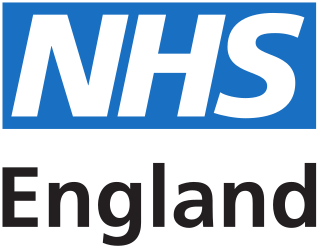St. Patrick's Mental Health Services is a mental health organisation in Ireland, with over 700 staff members delivering 12% of the country’s total in-patient care and treatment needs.

NHS Digital was the trading name of the Health and Social Care Information Centre, which was the national provider of information, data and IT systems for commissioners, analysts and clinicians in health and social care in England, particularly those involved with the National Health Service of England. The organisation was an executive non-departmental public body of the Department of Health and Social Care.
Salford Royal NHS Foundation Trust operated Salford Royal Hospital in Greater Manchester until 2017. Its chief executive is Dr Owen Williams.
Health and Social Care is the publicly funded healthcare system in Northern Ireland. Although having been created separately to the National Health Service (NHS), it is nonetheless considered a part of the overall national health service in the United Kingdom. The Northern Ireland Executive through its Department of Health is responsible for its funding, while the Public Health Agency is the executive agency responsible for the provision of public health and social care services across Northern Ireland. It is free of charge to all citizens of Northern Ireland and the rest of the United Kingdom.
The NHS Connecting for Health (CFH) agency was part of the UK Department of Health and was formed on 1 April 2005, having replaced the former NHS Information Authority. It was part of the Department of Health Informatics Directorate, with the role to maintain and develop the NHS national IT infrastructure. It adopted the responsibility of delivering the NHS National Programme for IT (NPfIT), an initiative by the Department of Health to move the National Health Service (NHS) in England towards a single, centrally-mandated electronic care record for patients and to connect 30,000 general practitioners to 300 hospitals, providing secure and audited access to these records by authorised health professionals.
SystmOne is a centrally hosted clinical computer system developed by Horsforth-based The Phoenix Partnership (TPP). It is used by healthcare professionals in the UK predominantly in primary care. The system is being deployed as one of the accredited systems in the government's programme of modernising IT in the NHS.

NHS England, formerly the NHS Commissioning Board for England, is an executive non-departmental public body of the Department of Health and Social Care. It oversees the budget, planning, delivery and day-to-day operation of the commissioning side of the National Health Service in England as set out in the Health and Social Care Act 2012. It directly commissions NHS general practitioners, dentists, optometrists and some specialist services. The Secretary of State publishes annually a document known as the NHS mandate which specifies the objectives which the Board should seek to achieve. National Health Service Regulations are published each year to give legal force to the mandate.
Herefordshire and Worcestershire Health and Care NHS Trust was established in Worcestershire, England, on 1 July 2011 to manage services previously managed by Worcestershire Primary Care NHS Trust's Provider Arm, as well as the mental health services that were managed by Worcestershire Mental Health Partnership NHS Trust.

The Isle of Wight NHS Trust is an NHS trust which provides physical health, mental health and ambulance services for the Isle of Wight. The trust is unique in being the only integrated acute, community, mental health and ambulance health care provider in England. It runs St Mary's Hospital and the Isle of Wight Ambulance Service.

Lancashire & South Cumbria NHS Foundation Trust, known as Lancashire Care NHS Foundation Trust until October 2019, provides a range of services including secondary mental health care, inpatient child and adolescent mental health services, perinatal mental health and forensic services including low and medium secure care. It also provides a range of physical health and well-being services in the community with partners in the Lancashire and Sefton area. The Trust was first established in 2002 and employs approximately 7,000 staff who provide care from more than 400 sites.
The Five Year Forward View was produced by NHS England in October 2014 under the leadership of Simon Stevens as a planning document.
Healthcare in Devon was the responsibility of two clinical commissioning groups until July 2022, one covering Northern, Eastern and Western Devon, and one covering South Devon and Torbay. It was announced in November 2018 that the two were to merge.
EMIS Health, formerly known as Egton Medical Information Systems, supplies electronic patient record systems and software used in primary care, acute care and community pharmacy in the United Kingdom. The company is based in Leeds. It claims that more than half of GP practices across the UK use EMIS Health software and holds number one or two market positions in its main markets. In June 2022 the company was acquired by Bordeaux UK Holdings II Limited, an affiliate of UnitedHealth's Optum business for a 49% premium on EMIS's closing share price.
Healthcare in Staffordshire was the responsibility of six clinical commissioning groups until July 2022, covering Stafford & Surrounds, North Staffordshire, South East Staffordshire and Seisdon Peninsula, East Staffordshire, Cannock Chase, and Stoke-on-Trent.
The "Greater Manchester Model" of NHS health care was a system uniquely devolved within England, by way of close integration with the Greater Manchester Combined Authority and local authorities, led by the Mayor of Greater Manchester. In July 2022 the Greater Manchester integrated care system took over responsibility for health and social care in the conurbation. The financial plan for 2022–23 had an initial shortage of £187 million.
Healthcare in the West Midlands was, until July 2022, the responsibility of five integrated care groups: Birmingham and Solihull, Sandwell and West Birmingham, Dudley, Wolverhampton, and Walsall.
IMS MAXIMS is a supplier of electronic health record software to the public and private sectors in UK and the Republic of Ireland.
Healthcare in Suffolk was the responsibility of two clinical commissioning groups until July 2022: Ipswich and East Suffolk, and West Suffolk.
In 2005 the National Health Service (NHS) in the United Kingdom began deployment of electronic health record systems in NHS Trusts. The goal was to have all patients with a centralized electronic health record by 2010. Lorenzo patient record systems were adopted in a number of NHS trusts. While many hospitals acquired electronic patient records systems in this process, there was no national healthcare information exchange. Ultimately, the program was dismantled after a cost to the UK taxpayer was over $24 billion, and is considered one of the most expensive healthcare IT failures.
Cambio Healthcare Systems is a healthcare company based in Linköping. It has offices in Reading, Berkshire, Aarhus, Stockholm, Århus and Motala. It provides computerised clinical decision support services.



